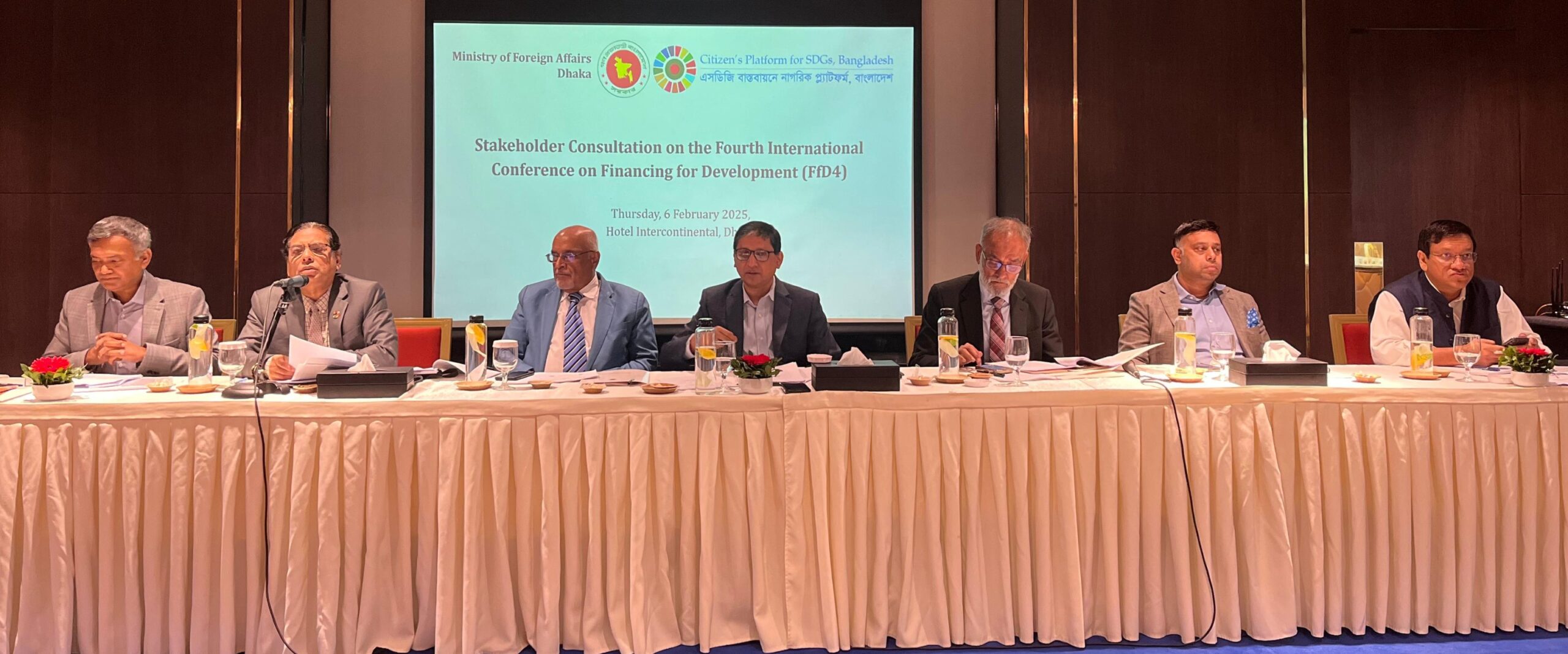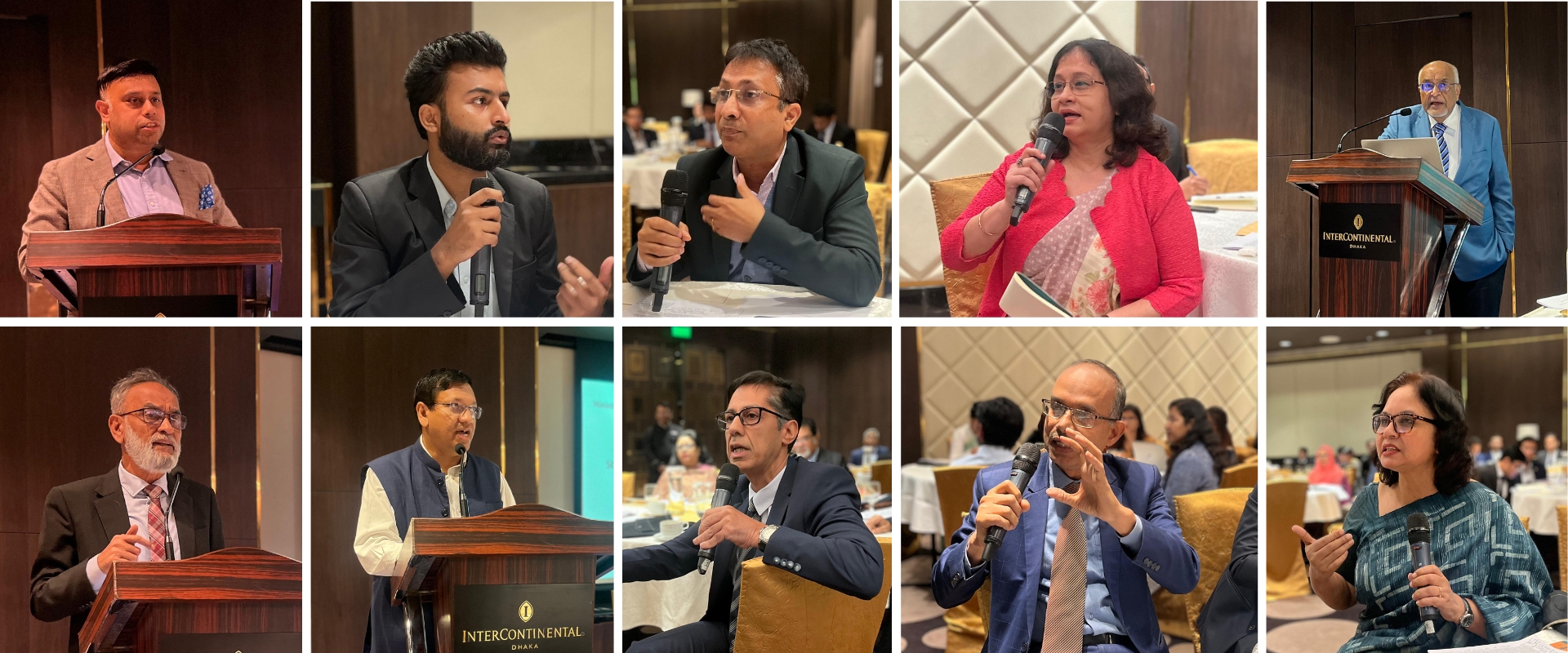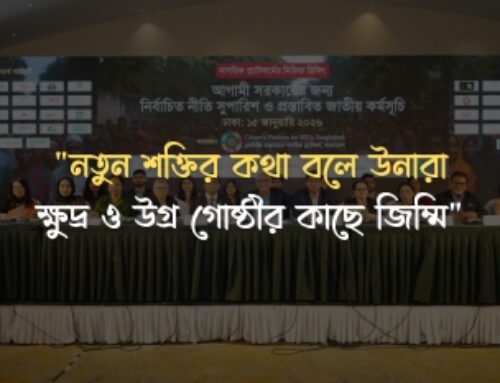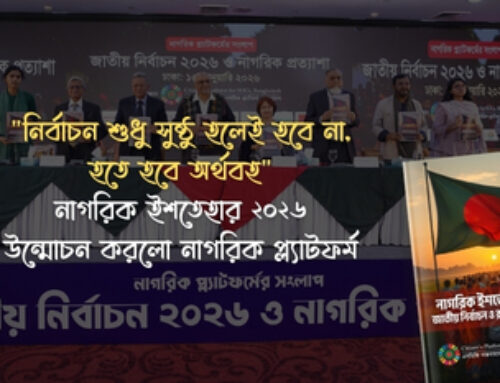
The Context
On Thursday, 6 February 2025, the Citizens Platform for SDGs, Bangladesh, in collaboration with the Ministry of Foreign Affairs, Government of Bangladesh organised a critical stakeholder consultation in preparation for the Fourth International Conference on Financing for Development (FfD4). The FfD4 conference is set to take place from 30 June to 3 July 2025 in Seville, Spain. In this context, the Zero Draft of the FfD4 outcome document, released on 17 January 2025, has been made available for public discussion, offering an opportunity for stakeholders to review and provide input. In line with this, the stakeholder consultation took place to gather valuable insights that can guide Bangladesh’s negotiations at the 3rd Prep-Com meeting, scheduled for 10-14 February 2025.
Dr Debapriya Bhattacharya, Convenor, Citizen’s Platform for SDGs, Bangladesh and Distinguished Fellow, Centre for Policy Dialogue delivered the keynote presentation while Mr M Riaz Hamidullah, Secretary (West), Ministry of Foreign Affairs, Government of Bangladesh provided the opening remarks at the consultation. The event featured four sessions moderated by Professor Mustafizur Rahman, Distinguished Fellow at the Centre for Policy Dialogue (CPD), with Dr M. Masrur Reaz, Chairman of Policy Exchange Bangladesh (PEB), Dr Mohammad A. Razzaque, Chairman, Research and Policy Integration for Development (RAPID), Mr Mohammad Muslim Chowdhury, Former Comptroller and Auditor General of Bangladesh and Mr Towfiqul Islam Khan, Senior Research Fellow, CPD serving as session chairs.

Six Critical Issues from Bangladesh’s Perspective
In his keynote presentation, Dr Bhattacharya highlighted six key areas of negotiation that are crucial for Bangladesh’s priorities in the upcoming conference:
Access to Official Development Assistance (ODA)
Access to ODA is crucial for Bangladesh, especially in advancing its developmental goals. The country needs to seek increased and more predictable financial flows from donor countries to support sustainable development initiatives, particularly in sectors like healthcare, education, and infrastructure. Bangladesh should aim to ensure that ODA is not only sufficient but also effectively aligned with national priorities for equitable development.
Flexibility in Debt Management
Bangladesh must advocate for greater flexibility in managing its debt obligations. With the rising challenges of debt servicing in developing countries, Bangladesh should be pushing for more adaptable debt management frameworks. This includes calls for debt restructuring mechanisms, as well as the need for international financial institutions to offer debt relief options, especially in the context of global economic uncertainties and external shocks.
Facilitating the Recovery of Laundered Money
Bangladesh needs to work to strengthen international mechanisms for combating the illegal movement of funds across borders. Bangladesh must stress the importance of transparent financial systems and the need for global cooperation to track, recover, and repatriate laundered money, which can be redirected towards critical development projects.
Fairness in Global Trade
Bangladesh should be advocating for reforms in global trade practices that would provide fairer market access for developing countries. This includes advocating for more equitable trade terms, the reduction of trade barriers, and an end to trade protectionism. Bangladesh also seeks to ensure that its domestic industries can compete on an equal footing in the international market, helping to create more opportunities for economic growth and poverty reduction.
Support for Domestic Resource Mobilisation
Bangladesh is keen on enhancing its capacity to mobilise domestic resources, such as through tax reforms, better revenue collection systems, and improved governance. Bangladesh should aim to reduce dependency on external financing by expanding its own fiscal space. Strengthening public financial management and improving local institutional capacities are critical in this effort to make the most of its resources for sustainable development.
Inclusive Systemic Reforms
Bangladesh should advocate for inclusive and systemic reforms in the global financing system. This includes promoting reforms that ensure the voices of developing countries are heard in decision-making processes at institutions like the World Bank and the International Monetary Fund (IMF). Bangladesh should seek an international financial architecture that is more responsive to the needs of the global South, ensuring that financing flows serve the broader goals of equity, sustainability, and social inclusion.
Way Forward for Bangladesh in the FfD4 Negotiations
To effectively navigate the upcoming FfD4 discussions and secure its interests, Bangladesh should adopt a strategic approach and proactive approach. By closely monitoring key negotiation deadlines and identifying both offensive and defensive issues that align with national priorities, Bangladesh can ensure its interests are effectively represented. Pursuing an issue-oriented negotiation strategy will provide the flexibility needed to adapt to evolving dynamics. Leveraging influential advocacy groups and maintaining active participation in text-based negotiations will further strengthen Bangladesh’s position. To facilitate seamless coordination, it is crucial to establish a dedicated support team in New York to provide vital assistance to negotiators throughout the process. This comprehensive strategy will enhance Bangladesh’s ability to successfully navigate the negotiations and achieve its desired outcomes.





Leave A Comment